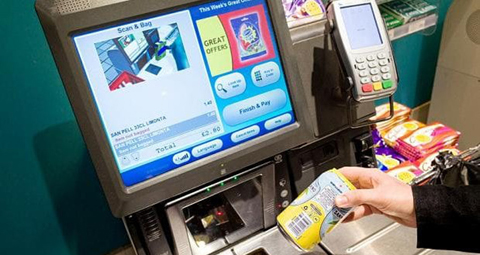October 26 | ![]() 0 COMMENTS
0 COMMENTS ![]() print
print

The Catholic view on a contactless world
With workers being replaced by machines, Fr Stephen Reilly suggests how best to respond
THE UK government is reportedly considering enlisting Britain’s postal workers to check in on lonely elderly people, chat to them and link them in with local community support.
This laudable initiative is a response to government surveys showing that three quarters of GPs see between one and five patients a day who are suffering loneliness.
Meanwhile, earlier this year Amazon opened an entirely automated grocery store, Amazon Go, in Seattle. Closer to home, a greater proportion of tills are automatic, and supermarkets are considering scan-as-you-shop, to eliminate tills altogether.
This may in turn be a response to increasing internet shopping, which accounts for 17 per cent of UK sales. Anyone who has witnessed the proliferation of scanners in their local supermarket might begin to discern in these seemingly unrelated stories the increasingly familiar and uneasy nexus of cashier-free tills, atomised social interactions and increased loneliness.
Is the changing face of our shopping habits a moral issue, or merely a question of convenience? What about the cashiers who, presumably, are no longer employed or hired? And does the anonymous interaction with a machine erode our social ties? Does Catholic Social Teaching (CST) have something to contribute?
One of the seven principles of CST is the dignity of work and the rights of workers. The earliest document in the CST canon, Pope Leo XIII’s Rerum Novarum (1891), had as its backdrop the industrial revolution and the widespread mechanisation of labour: Pope Leo affirmed that, ‘capital cannot do without labour, nor labour without capital.’
Has this connection been broken? It can be argued that retail has always evolved: from the market to the shop, to the supermarket and the internet, and that with the inevitable automation of some tasks, humans will gravitate to other work.
Kenneth Rogoff, a former chief economist of the IMF, gives the illustrative example of chess: when a computer beat world champion Gary Kasparov in 1997, sponsors’ interest in staging world championships declined, and professional chess-players lost work.
Nonetheless, computer programmes and online matches caused an upsurge in amateur playing, allowing careers in chess teaching and coaching to flourish.
In the case of contemporary manufacturing and retail, however, economists are worried that the examples from the past no longer hold. Academics and economists have argued that technology is destroying jobs faster than it is creating them, and that the traditional link between increased productivity and increased employment is diverging.
So we cannot be sure that the lost cashiers in our banks, post offices and supermarkets will be able to gain employment elsewhere, and this should cause us concern as Christians.
As the US Bishops said recently: “Work should be the setting for rich personal growth, where many aspects of life enter into play: creativity, planning for the future, developing our talents, living out our values, relating to others, giving glory to God… it is essential that ‘we continue to prioritise the goal of access to steady employment for everyone.’”
What can we do? Everyone in the equation seems to be powerless. What can one consumer achieve?
What can a shop do when threatened with online competition, the pressure of greater efficiency, and increasingly impatient customers who no longer tolerate queuing?
Similar sentiments were expressed 20 years ago at the first stirrings of the Fairtrade movement, or even five years ago as we seemed to drown in single-use plastic bags.
Change, however, was possible: consumers were tempted by Fairtrade products sampled from stalls in their parishes and places of work, and shops and producers eventually followed; the 5p charge gave customers permission to ask themselves why we couldn’t reuse our carrier bags. The consumer is king.
MIT economist Daron Acemoglu noted: “These economic and technological conditions that are determining where automation is taking us, they are not set in stone. They are societal choices.”
Catholic Social Teaching bids us act: “Consumers are moral agents in economic life. By our choices… we enhance or diminish economic opportunity, community life, and social justice”.
So next time you are at the supermarket, consider walking past the row of faceless machines, even if it means queuing for a couple of minutes longer, and speak to a human being.
We were created to be sociable, not lonely, and some algorithm may eventually conclude that the customer, who is always right, would like to keep our precious, friendly and efficient cashiers in work.
Fr Stephen Reilly is co-ordinator of Spiritual and Pastoral Formation at the School of Education, and member of the St Andrew’s Foundation.










